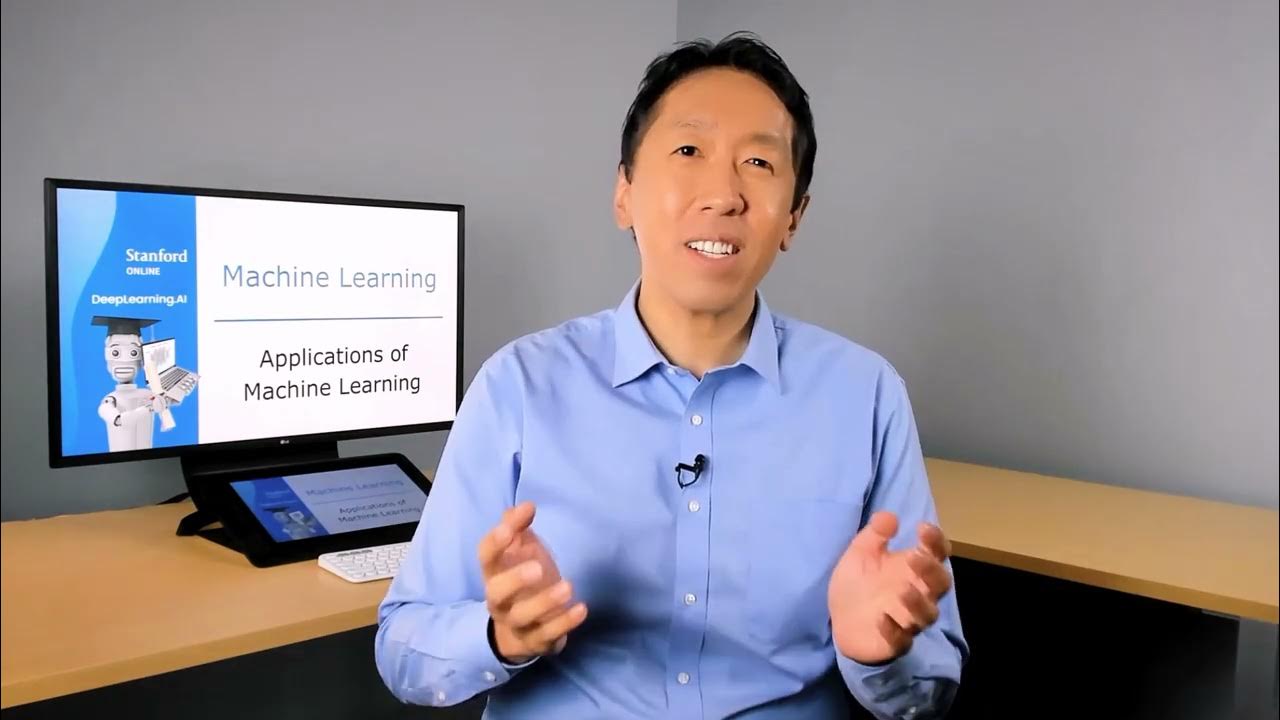5.0. Mathematics for Machine Learning - Introduction | Machine Learning Course
Summary
TLDRIn this video, Siddhartham introduces the fifth module of his Anson Machine Learning course, focusing on the essential mathematics behind machine learning. He explains the importance of understanding four core mathematical concepts—linear algebra, statistics, probability, and calculus—when mastering machine learning and deep learning. These concepts are integral for analyzing data, optimizing models, and making predictions. Siddhartham emphasizes that, while often overlooked, mathematics is key to fully grasping how machine learning algorithms work. The course will dive deeper into each topic through multiple videos, with new content posted every Monday, Wednesday, and Friday.
Takeaways
- 😀 Mathematics is crucial in mastering machine learning and deep learning, and it cannot be ignored if you want to truly understand the field.
- 😀 The course will cover four key areas of mathematics: Linear Algebra, Statistics, Probability, and Calculus.
- 😀 Linear Algebra is essential for data representation and manipulation, particularly with matrices and vectors, which are used to represent datasets.
- 😀 Statistics helps in understanding the data better by analyzing measures like mean, standard deviation, and identifying outliers.
- 😀 Probability is vital for making predictions and understanding the likelihood of outcomes, such as predicting if a person has a certain disease.
- 😀 Calculus, specifically differential and integral calculus, is key for optimizing machine learning models, especially through techniques like gradient descent.
- 😀 Ignoring the mathematical aspects of machine learning can lead to difficulty in mastering the subject, as they form the backbone of the models and training processes.
- 😀 The course is structured into multiple videos for each concept, offering a detailed breakdown of topics like linear algebra, statistics, and calculus.
- 😀 Each mathematical concept is not only important in its own right but also integral to building and training machine learning models effectively.
- 😀 The course aims to make complex mathematical topics easier to understand by breaking them down into manageable parts, ensuring students can apply them practically in machine learning projects.
- 😀 Video content will be released on a regular schedule: mathematical topics on Monday and Wednesday evenings, and machine learning projects every Friday.
Q & A
Why is mathematics important in machine learning?
-Mathematics is fundamental to understanding and developing machine learning models. It helps in data analysis, model development, and optimization. Without a strong mathematical foundation, it's challenging to grasp how machine learning algorithms function and how to improve them.
What are the four key mathematical concepts covered in this module?
-The four key mathematical concepts covered in this module are Linear Algebra, Statistics, Probability, and Calculus.
How does linear algebra relate to machine learning?
-Linear algebra is crucial in machine learning because it helps in representing data as matrices and vectors. Most machine learning computations, including those involved in data processing and model training, rely on matrix operations and vector transformations.
What role does statistics play in machine learning?
-Statistics is essential for understanding the data used in machine learning. It helps in analyzing data distributions, calculating means and standard deviations, identifying outliers, and creating statistical models. It is also integral to many machine learning algorithms, which are based on statistical principles.
Can you explain the difference between descriptive and inferential statistics?
-Descriptive statistics involves summarizing and describing the features of a data set, such as calculating averages and standard deviations. Inferential statistics, on the other hand, is about making predictions or generalizations about a population based on a sample of data, often involving hypothesis testing.
How is probability used in machine learning?
-Probability is used in machine learning to estimate the likelihood of various outcomes. For instance, when predicting if a person has diabetes, a model might output the probability of the person having diabetes, which helps in making informed decisions or classifications.
Why is calculus necessary for machine learning?
-Calculus, specifically differential and integral calculus, is necessary for optimizing machine learning models. Differential calculus helps in understanding how small changes in parameters affect the model, while integral calculus is used in aggregating and optimizing these changes (e.g., gradient descent).
What is gradient descent, and how does calculus play a role in it?
-Gradient descent is an optimization algorithm used to minimize the loss function in machine learning models. It involves adjusting model parameters iteratively to find the minimum loss. Calculus, particularly differential calculus, helps by calculating the gradient, or the rate of change, of the loss function with respect to the model's parameters.
What topics will be covered under the linear algebra submodule?
-The linear algebra submodule will cover topics like vectors, matrices, and matrix operations. These are foundational concepts for understanding how data is represented and manipulated in machine learning algorithms.
What is the video release schedule for this course module?
-The course module will release videos on mathematics every Monday and Wednesday, with machine learning project videos posted every Friday.
Outlines

This section is available to paid users only. Please upgrade to access this part.
Upgrade NowMindmap

This section is available to paid users only. Please upgrade to access this part.
Upgrade NowKeywords

This section is available to paid users only. Please upgrade to access this part.
Upgrade NowHighlights

This section is available to paid users only. Please upgrade to access this part.
Upgrade NowTranscripts

This section is available to paid users only. Please upgrade to access this part.
Upgrade NowBrowse More Related Video

Module 8. Introduction - Cross Validation; Hyperparameter tuning; Model Evaluation

What Order You Should Learn From My Udemy Course On Data Science And Generative AI

#2 Machine Learning Specialization [Course 1, Week 1, Lesson 1]

Explainable AI Tutorial (XAI) | Part- 1 | Types of Machine Learning | Python

M4ML - Linear Algebra - 1.1 Introduction: Solving data science challenges with mathematics

V1. Data Types | Linear Algebra for Machine Learning #MathsforMachineLearning
5.0 / 5 (0 votes)